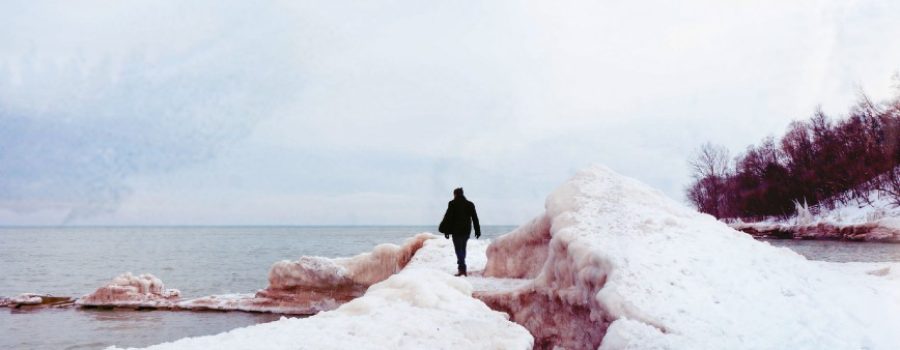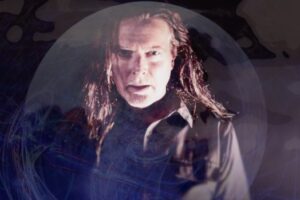It’s hard to know how different everyone’s lives would be in this present moment had the world not undergone some pretty unprecedented events back in 2020. Some of us might be in the exact same place we are now, but most of us were truly moved in new and unexpected directions, especially the creative types. Music has always reflected the realities of the world, and artists such as Ceiling Spirits know all too well that 2024’s ‘The Bloodwren’ would have been entirely different. However, no one is mad at what we have – a guitar-driven musical experience that takes plays like a favorite film. We talked to Ceiling Spirits’ Mario Quadracci about all of the above and then some in this back-and-forth exchange.
Kendra: To say any of us are the same people we are today as we were before 2020 would be a lie. Those years impacted us as a whole from our day-to-day to creative endeavors. So, I’d like to know before we dive deeper into this – do you think ‘The Bloodwren’ would’ve been a totally different follow-up to your 2018 debut had 2020 gone differently?
Mario Quadracci: That’s an interesting question and I think the answer is definitely, yes, and in a number of different ways. There’s an edge to these compositions–bordering on almost metal in some spots– that the last record totally lacked. I think that comes from the frustration of living in such desperate uncertainty and feeling utterly powerless against, not only just an unknown virus but the array of other consequences it brought with it. I don’t remember consciously thinking about it at the time I was writing, but now I can definitely hear the music as a response to what I was feeling at the time.
There’s a lot of pushback against circumstance in these tracks. There is also a lot more complexity to these compositions than what is on the first record. If there was a silver lining to being locked down, estranged from family and friends, etc. it’s that it gave me lots of time to be very detail-oriented while composing and arranging. Usually, I would come up with a broad outline for the music and let my collaborators do pretty much whatever they want during recording, but almost everything you hear on this record was committed to staff paper first and all of the guest musicians played exactly what was written. There are also a lot of political themes to the album’s narrative that were informed by that aspect of the times as well
Kendra: It’s been noted that this EP is about the cycle of chaos, the weak being impacted and turned nasty by cruelty. It’s not hard to draw parallels to how we witnessed the worst of mankind in recent years. What sort of set that off for you though when you were starting to conceptualize this record? Like was there one day in particular, one instance that made you sit down and start to write?
Mario: The political and social turmoil of that time left me deeply confused. I tried and tried to understand how people could get behind, what I saw to be, such a bitter and reactionary movement that seems to me to be devoid of all content beyond pure fuck-youism. On some level, I could see why an ordinary guy who lost his job to automation, or whatever, whose town has gone belly up could be seduced by a movement promising to weed out and punish the shadowy culprits of their misery, but I couldn’t grasp how so many who seemingly know better abandoned their espoused principals and surrendered to this thing with all of its roiling anger and wacky conspiratorial underpinnings.
The character of The Bloodwren is a deeply broken individual who wants nothing more than to sow chaos for its own sake. The Bloodwren doesn’t seek to be the one in the spotlight but rather he finds someone else that he can mold, sell and elevate then steer from the shadows. I had some very particular people in mind when creating the character, people I saw as the real architects and captains of this new political phenomenon who found a useful buffoon they could control with whispers and the promise of endless adulation.
Kendra: Being that a lot of albums come through my inbox daily, it’s not hard to notice that the aspects and reality of the pandemic have played a heavy hand in music, but more so the more DIY, indie artists. Why do you think a great deal of mainstream artists have been afraid to be more honest about how those years affected them?
Mario: I think it has to do with the escapism that those who create this type of product are selling. People were exhausted by the turmoil brought on by the pandemic and many people still carry emotional wounds they might not even know they have because of it. It’s uncomfortable to be reminded of difficult times and people may be craving more shallow, hedonistic content after such heavy times. I can’t really blame that part of the industry for giving people what they want. I can say, though, that in my opinion the best art is born from honest explorations of the darkest, hardest, most incomprehensible trials of history. If every artist resorted to selling booty-shaking, sex-dripping, look-at-my-bling content after the world experienced a crisis we’d be missing a lot of cultural treasure.
Kendra: Let’s talk about “Falter” now. A great song that has a lot of cinematic weight to it. With that, and ‘The Bloodwren’ being a musical in itself, if this were to be performed on stage in a theater, who would you cast as the lead?
Mario: I love this question! It’s funny because as soon as I heard it a totally unlikely actor popped into my mind. Tony Hale from ‘Veep’ and ‘Arrested Development’ would be perfect. He’s best known as a comedic actor but he looks almost identical to the real-life person I largely modeled the character of the Bloodwren on. There’s a long tradition of comedic actors playing a serious role and crushing it.
Kendra: Also, being a multi-instrumentalist – what instrument took the lead with this record for you, and why do you think that is?
Mario: My primary instrument is guitar and it’s almost always where I get my seeds of ideas, just noodling around or trying to figure out from memory something that caught my ear. I don’t know why but around the time these pieces came to be I was experimenting with a lot of exotic tunings and much of the harmony and voicings that you hear in the strings comes from that.
During lockdown, I also got very into experimenting with euro rack modular synthesizers. I can be too academic when composing music in the traditional way so I wanted to keep my relationship with modular as intuitive as possible so I just experimented with them until interesting things began to happen and I began to develop a feel for the way I like patches to be constructed. People get very precise with synthesis and I consciously tried to avoid that allowing my gut and accident to lead to innovation.
Kendra: Time for a side note – With it being April, I’m asking everyone to think of a pair of tickets to any concert ever that they’d want to find in their Easter basket. Artists can be living or dead, past or present. Which concert or tour would you have loved to see?
Mario: This is so hard. But if the Easter Bunny is only granting one wish I’ll have to go with the Paris debut of Stravinsky’s ‘The Rite of Spring.’ The ballet was so radical both musically and conceptually–it’s about an ancient sacrificial ritual–that the audience rioted! Witnessing something so uniquely groundbreaking and iconoclastic in person–people just freaked the fuck out because it was so alien to their sensibilities. I’m going with that but requesting a seat near the exit.
Kendra: Lastly, with ‘The Bloodwren’ out now, what else can fans expect as 2024 rolls on?Mario: I have to check on Tony Hale’s availability before I can answer that.






